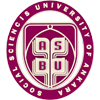About Us
Paul Samuelson, one of the most prominent economists of the twentieth century, defines economics as:
“The study of how men and society choose, with or without the use of money, to employ scarce productive resources, which could have alternative uses, to produce various commodities over time and distribute them for consumption, now and in the future, among various people and groups in society (Samuelson, 1967).”
Rather than constraining economics to the study of efficient allocation of scarce resources, the Department of Economics contends that economics should also deal with problems such as unemployment, sustainability of environment, and economic development. Students who study economics at ASBU are expected to
- understand economic change and make sound economic predictions by reducing complex economic issues to manageable problems,
- enhance their research, analytical, and creative abilities,
- create solutions to local, national, or global economic problems,
- obtain a well-rounded undergraduate education in economics within a wide range of disciplines ranging from sociology, public administration, psychology, and history to statistics and mathematics,
- have the capacity to do theoretical and empirical research in the fields they specialize,
- acquire leadership and cooperation skills.
The Department of Economics aims to give a high-standard education to its students using up-to-date national/international resources and publications. Since ASBU specializes in research, all faculty members have publications in reputable national/international journals. Since our faculty members have specialized in a wide variety of fields, the courses offered are given by those whose research areas are closely related with the subjects covered in the courses.
Apart from English, students at ASBU have an opportunity to learn a second foreign language. The Department of Economics encourages students to benefit from this opportunity.
The Department of Economics supports student-exchange programs such as Erasmus, Farabi and Mevlana.
Graduates with a bachelor's degree in economics are able to follow an academic career.
Alternatively, they can seek to be employed by private firms, public institutions, or regulatory bodies after obtaining their degree. In these institutions, they can work as economists, bank managers, chartered accountants, or economics specialists in ministries. Some institutions where graduates can find a job are listed below.
- Ministry of Finance
- Treasury
- Ministry of Economy
- The Central Bank
- Turkish Competition Authority
- Capital Markets Board
- Financial institutions
- Public and private banks
- Public and private firms
--- Click here to view the list of books recommended by department members ---
